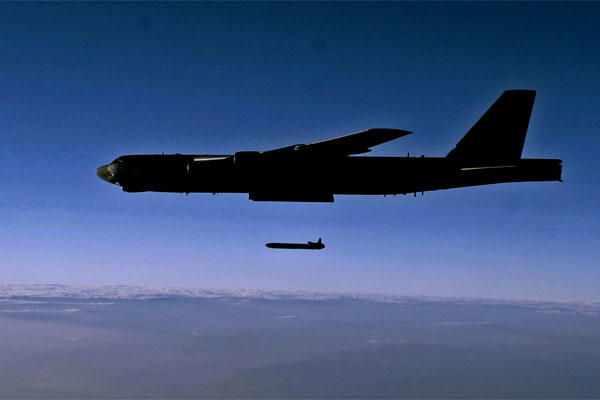Twelve U.S. warplanes, including a B-52 Stratofortress bomber and A-10 Thunderbolts, carried out a massive airstrike Monday on a suspected chemical weapons production complex in the ISIS-held stronghold of Mosul, Iraq, the commander of U.S. Central Command air forces said Tuesday.
The sprawling complex in the Mosul area had been a pharmaceutical factory and was suspected of having been taken over by ISIS to produce "chlorine or mustard gas -- we don't know for sure at this point," said Air Force Lt. Gen. Jeffrey Harrigian, the commander of U.S. Air Forces for U.S. Central Command in southwest Asia.
In a video briefing to the Pentagon, Harrigian said the airstrike included F-15s, A-10s, F-18s, F-16s and a B-52. Twelve aircraft in all targeted "50 points of interest" in the complex.
He said that the Islamic State of Iraq and Syria had "converted a pharmaceutical plant complex into a chemical weapons production facility that also served" as a headquarters building for ISIS commanders in the area.
Despite the intensity of the airstrike, it was not the largest carried out recently in the Mosul area, according to CentCom. In late August, 17 warplanes, including B-52s and Belgian F-16s, combined in a massive airstrike on a factory for Vehicle Borne Improvised Explosive Devices, CentCom said.
As the anti-ISIS campaign presses on Mosul and Raqqa, the self-proclaimed ISIS capital in northeastern Syria, the U.S. has become increasingly concerned that ISIS will resort to chemical weapons.
In August last year, U.S. Central Command reported that about 70 Kurdish Peshmerga fighters allied with the U.S. were incapacitated from what was believed to be a mustard gas attack in northern Iraq. Air Force Col. Pat Ryder, a CentCom spokesman at the time, said it was well known that ISIS was seeking to acquire chemical weapons and "they clearly have demonstrated that they are a barbaric and inhumane enemy."
Last month, the United Nations-affiliated Organization for the Prohibition of Chemical Weapons found that Syria's air force had used chlorine gas at least twice since 2013. The organization also found that ISIS was suspected of a mustard gas attack. ISIS was "the only entity with the ability, capability, motive and the means to use sulfur mustard" gas in the Aleppo area of Syria on Aug. 21, 2015, the group said.
At the time, National Security Council spokesman Ned Price said the U.S.-led anti-ISIS coalition had placed "a high priority on targeting" ISIS chemical weapons capabilities, CNN reported.
"We will continue to remove leaders from the battlefield with knowledge of these weapons and will target any related materials and attempts to manufacture such chemicals going forward," Price said.
-- Richard Sisk can be reached at Richard.Sisk@Military.com.
Related Video:
B-52 Stratofortress | Bullet Points





























